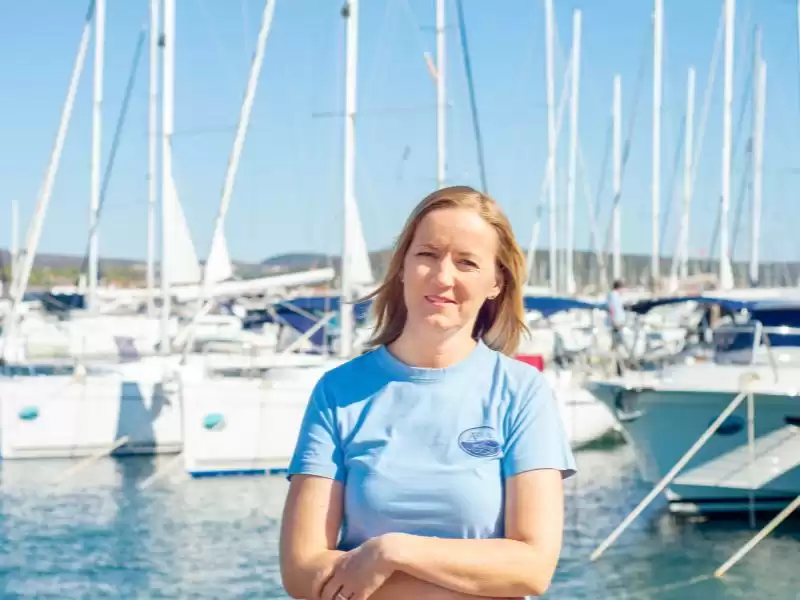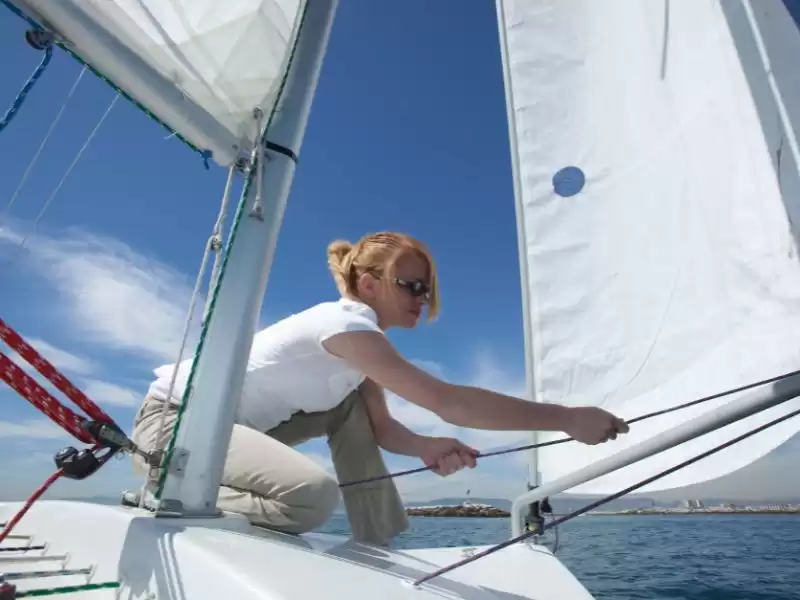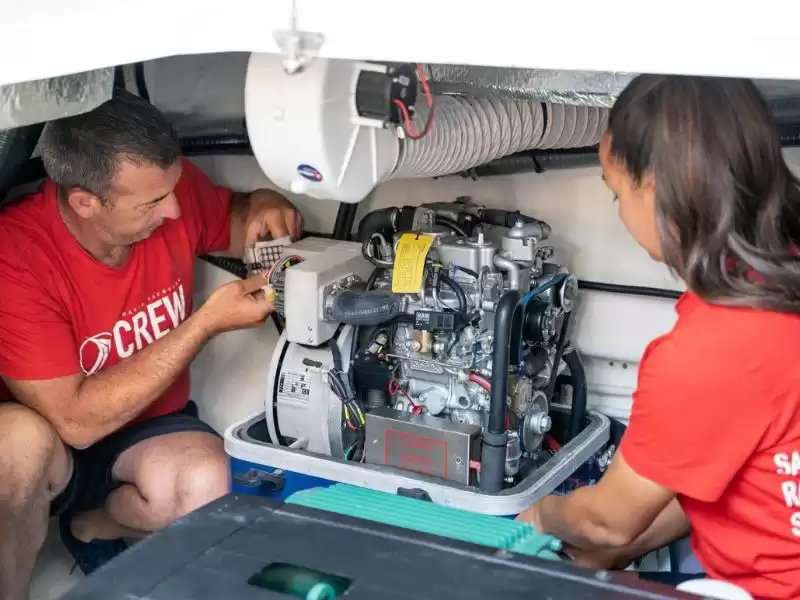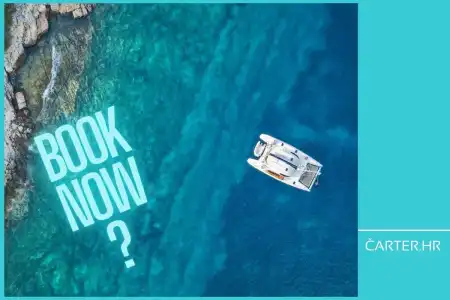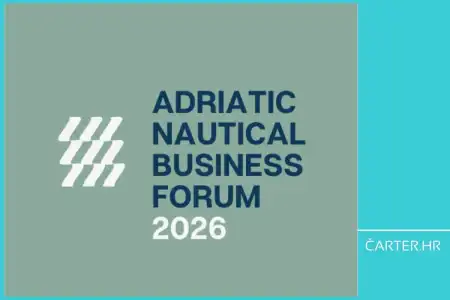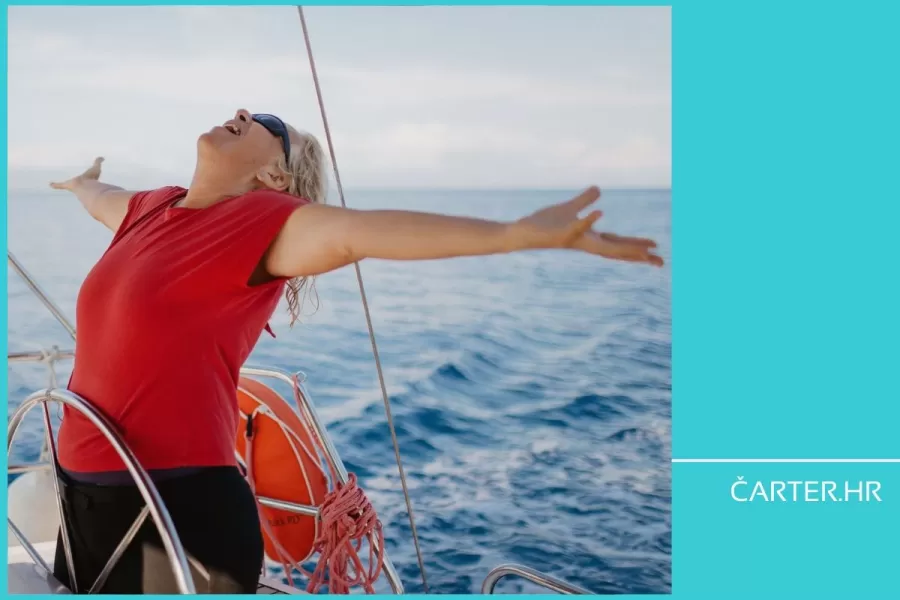
- 08.03.2023.
- News
Atypical occupations for women? It could be that these are occupations that were considered reserved for men until now. But in the nautical charter, women are increasingly overcoming those stereotypes. These are their stories.
For many years, nautical charter was considered a male-dominated industry. Men worked (and still work) in positions of managers, sales representatives, mechanics, skippers, electricians, carpenters, and deckhands. And we don't even have to mention the positions of CEOs or owners. On the contrary, women were the ones who worked as housekeepers or in administration, reception, bookings, and accounting.
Nowadays, there is not a big difference, but the situation has started to slowly change.
Within the last few years, there has been a shift in the charter industry because more women are entering this industry and overcoming stereotypes we've known so far. There's a growing number of women in positions such as CEO, sales manager, and reservations. Women have not only started to enter the ownership structures of charter companies, but they have also started to occupy positions that were considered predominately 'male'.
So, especially today, for the first time, we would like to bring all those rarely mentioned women in this business to the fore. For all those housekeepers and cleaners who work hard and contribute to a charter company by leaving the best impression on the guest and making the guests feel comfortable on a clean and fragrant vessel.
Our focus is on women who work in 'men's' occupations, from mechanics who have mastered the art of engine maintenance to skippers who sail on tours of 7 or 14 days and are available to guests 24 hours a day to women who do seamanship at the base. We would like to emphasize the skills and expertise of these women who prove that gender is not an obstacle when it comes to work and that, on the contrary, being women in 'male' occupations gives them a different perspective and is often an advantage.
On today's International Women's Day, we celebrate women who face challenges every day doing 'men's' jobs in the charter, and we are bringing you their unique stories.
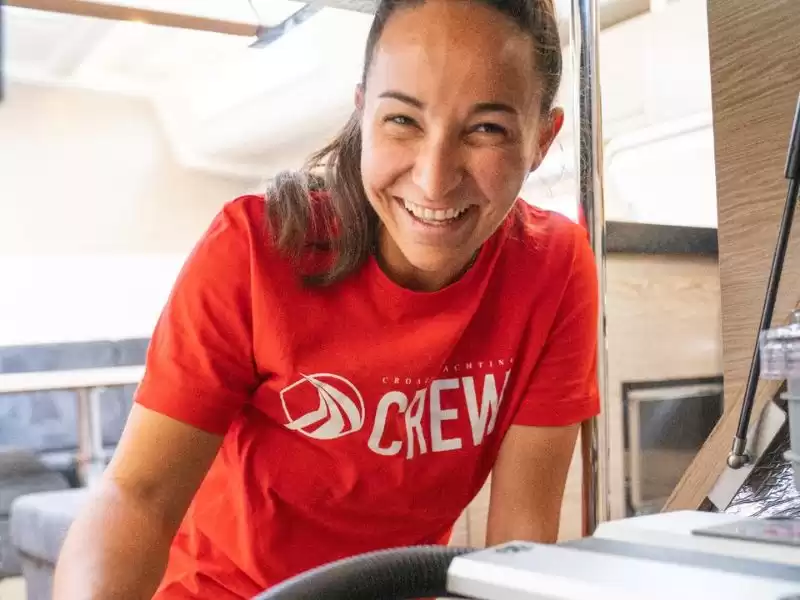
"It's just an engine; you'll nail it"—the first encounters of our women in charter with their future careers
It doesn't happen very often to meet a woman mechanic in one of the car service places, and it happens even more rarely to find a woman mechanic in the charter industry. However, rare doesn't mean impossible.
This is proven by Petra Tomić, a young perspective car mechanic, who currently works in the service team of Croatia Yachting in Kaštela. Even though she started working there four years ago, she feels that she has learned a lot, but also points out that there is still plenty of room for improvement.
"Since I was a little girl, I was interested in mechanics, but I have never thought about nautics, but about car service, and consequently finished Industrial and Crafts high school in Šibenik, graduating in automechatronics. By force of circumstance, I am here in the service team of Croatia Yachting, where my career began four years ago as an assistant mechanic.
It was all new to me at the time, too unknown, there is a large fleet, I wondered how and if I would manage. That is when my mentor Špiro said "It's just an engine; you'll nail it". As it was four years ago, it is the same today: Špiro continues to be my big support with a lot of patience and willingness to explain the unknown. With a good mentor and the support of the rest of the team, every job is easy and done with satisfaction."
On the other hand, our woman skipper Tanja Dinter Vidaković from Zagreb, who was 26 years old when she stepped on a sailboat for the first time, says it was love at first sight. She fell in love with the sea, the wind, the marinas, and the boats. One summer was crucial when she concluded (after having a bad experience with a non-professional skipper) that no one would ''drive her around'' and that she could do it all by herself.
When she passed the skipper's exam, people around her thought it was a great hobby or a way to spend the holidays, but they thought being a skipper is not a real career. Years passed by, and the main trigger for Tanja was when she lost her long-term job. So, one door closed for her and another opened, and she made a decision: her love for sailing would become her real job.
When she was supposed to go on the first route as a skipper, although an experienced sailor and regatta participant, her first reaction was to run away. Taking over the 16-meter sailboat and driving the guests seemed impossible for her. But her will and desire prevailed, as did her sense of responsibility and her belief that a person grows by leaving their own comfort zone. Finally, in that first real sailing, no one even noticed that it was her first real skippering.
Katarina Nimčević who is currently employed as a housekeeper at Asta Yachting in Sukošan, says that her job came somewhat unexpectedly but at the best time, when she urgently needed a job. She thinks that the work in charter is different from all other jobs she has done up to that point, but it has its own charms. She believes that working with people has its good and bad sides, but she looks forward to every new day because she has the opportunity to do the work she loves.
Marina Panđa, who once worked on vessel maintenance in the charter fleet in Biograd (sailor at the base), and today works in the administration, says that she found herself in charter quite by accident, starting with the sailing school.
"I found myself in the charter almost by accident. I went to sailing school at the Yacht club Biograd and worked in a cafe where the guys who work in the marina used to come. The job of ship maintenance seemed interesting to me, and then I started asking from charter to charter if they needed workers, but usually the answer was that their office was full or that they didn't need a housekeeper. When I said I wanted to maintain ships, they didn't take me too seriously. Then Mr. Gordan Borčilo gave me the opportunity."
Today, Marina no longer works in maintenance, but she says that nostalgia still draws her in, so she sometimes escapes to paint the footbridges.
Working day of women in the charter? Yacht, marina, open sea, and many challenges (and a lot of patience)
Not surprisingly, the working day of these charter women is like the working day of any other employee, but the work they do is different, and on top of that, their workplace is not standard; it is a marina, a yacht, or the open sea. Their day-to-day work tasks include paperwork, but also engine mirroring, service and repairs, work in the shipyard, cleaning, and monitoring of the vessel.
Every breakdown and every unforeseen situation is a challenge, even for the most experienced in the charter industry, including these charter women. Working with people, whether they are colleagues, external cleaning services, or other services, they all need to complete their tasks on time to keep guests happy and satisfied. It can be said that time is not a great friend either, especially in the season when all tasks need to be done immediately and now.
During the season, Saturdays are reserved for the check-out of guests and the handover of the vessel, a real hustle and bustle. Taking care of the cleanliness of every sailboat, motorboat, or catamaran; taking care of the safety and technical correctness of the vessel itself; as well as ensuring that the passengers have a good time - all of this is included in the description of the tasks of these women. With a short time to complete all these tasks, high summer temperatures, and guests with different demands, stress accumulates very quickly, but everything can be sustained with good organization and, most importantly, with a good team at work.
Our women in charter say that they needed adaptation for their jobs, and it was mostly related to the physical part of the job; when it was necessary to lift something heavy, such as the platform of a large sailboat or a dinghy.
Tanja on the other hand, says: "Patience, organization, adaptability. Every week there are guests of different nationalities with different customs and habits, and the living space is small and limited. You have to adapt to them, be present and available, yet invisible. I repeat: This is their vacation, they have probably been waiting for it for a whole year, and I try to adapt it to them. On the other hand, everything must go smoothly, with as few problems as possible, so that they don't notice them and, if they do, they feel in safe hands. Sometimes we need to find a doctor on the island, a restaurant where they will eat well, a bay where they will be alone, the turquoise colour of the sea, etc."
All in all, our women point out that they did not have too many different challenges just because they are women, but that there was a process of adaptation, especially in the more physically demanding parts of the job. They do not see themselves as any different from other colleagues, and they say that times have changed after all.
Katarina, on the other hand, thinks that it is much easier to work in a male-dominated industry because men are much simpler in their work than women; there are not too many complications.
"The most challenging part of my job is working with the women who work for the service that cleans our boats during the season. It's challenging because women employees keep changing, and sometimes it takes a lot of patience to work with them."
Do you need specific skills to work in a charter?
Not only women, but everyone who works in a charter should be a virtuoso at organizing time and be resourceful as if they were preparing for an Olympic discipline. Working in a charter requires the ability to work in a team, having communication skills, and working with people, as well as adapting to the different requirements of superiors, colleagues, and guests.
Petra, a mechanic, points out: "The most important skill in our job is primarily the ability to work in a team, then handling certain tools, resourcefulness, steady hands, and sometimes imagination. I believe that I have perfected all the above-mentioned skills through experience."
A woman/male skipper should be a good psychologist and communicator, the guests are of different nationalities and cultures, and they spend their vacation on, for example, a sailboat, which is a relatively small space.
A housekeeper needs to clean yachts quickly and efficiently while cooperating with many often inexperienced colleagues. This requires the special skills that most people working in tourism have: efficiency in the shortest possible time. In addition, they know how to be both present and invisible at the same time.
Working on a charter requires a lot of various adjustments, at least that is what our women in charter say, so that the vacation in the season goes smoothly for everyone, both for the guests and for their team.
The experience gained on a charter, even a basic one, is precious and valuable, especially if they later want to transfer to another job in tourism. Today, Marina works in an office, but she says: "Resourcefulness and will were definitely the most important, although I assume that is important in every job. And I have to admit that that particular job helped me a lot in this current one. I know a little more about ships than, for example, my colleagues, and then that helps quite a bit in, for example, invoicing owners, booking, and resolving claims either with guests or with insurance."
Organization is important to everyone, and women in charter are the best at it
In Croatia, it is true that while others are working, skippers and other charterers are resting. But also, while "normal" people are resting, charters are working at full speed. You can rest in the winter or in the late season, and you can always rest if the weather is organized well.
Working for a charter company is often not a job with regular working hours from 8 a.m. to 4 p.m., and it also requires certain compromises. The diversity of work can be cited as an advantage of working in a charter; there is certainly never a dull moment in the charter. A big plus is the fact that in some jobs it is possible to spend the whole summer at sea, sailing with guests and making new friends.
Our protagonists say that they need to organize themselves well in order for their private lives and workdays to run smoothly. They say that they succeed in this even in the heart of the season, and that over time they have learned to excel in it.
Taking into consideration that we interviewed really interesting women of various ages and positions for this article, their perspectives and experiences are therefore different. However, we were interested in whether they had to sacrifice some part of their lives in order to do the work they do?
Petra, as a young woman, is maintaining a good balance between her private and business lives for the time being, and she believes that she did not have to 'sacrifice' anything because of her work. Marina just cheerfully dismisses this question with a wave of her hand. Katarina also says that she does not think that she should have sacrificed anything by working at the charter.
However, sailing and the season separated Tanja from her family, although she says that she has a family that supports her in everything, including this job. Today, she has replaced classic sailing with training on sailboats and catamarans. In cooperation with experts from other fields, she organizes various thematic and educational sailings, such as Yoga week, cooking workshops on board, Sail&Hike program, etc. Her plan is to make a story that will grow and develop so that she can be a skipper and organizer in programs that are interesting to her.
Technology in charter – from writing in notebook to all the necessary information on the mobile phone
For some people in the charter, progress in new technologies doesn't mean a lot because it is minimal for the needs of their work. If anything, new happens, it is easy for them to stay informed through additional training.
On the other hand, technology facilitates the work of skippers, administration, and booking staff from season to season. The women in our story have come a long way, from recording all the data in a notebook and stacks of nautical charts to today's central systems and applications for mobile phones. Not only do they make their daily tasks easier, but they also have everything in one place: maps, forecasts, alarms for anchoring, and vessel monitoring.
However, they emphasize that this doesn't mean that one should not be able to read maps in paper form or enter into a conversation with local people in order to obtain information that only they know best. After all, even technology can fail sometimes, and even a mobile phone can end up in the sea.
The importance of a mentor and confirmation of good work
Our women in charter say that they would not be where they are today without their mentors, who took them "under their wing". In the charter industry, the mentor has always been an important figure, especially if he or she knows how to transfer his or her knowledge well. And we don't even have to emphasize the saving of time, which is always too little in the season.
Today, mentoring continues with new generations, often through groups in messaging applications where all the information and daily tasks are exchanged.
Marina says: "I had the most amazing mentor, Neno Tolić. He taught me how to work, how to hand over, how to interact with others, and how to operate a boat. He was always calm; you couldn't notice Saturday's stress on him. But I have to admit that all my colleagues were my mentors, even from neighbouring charters.
It is certainly important to have a mentor, I can see even now from the team at work, how the older ones teach the younger ones and how much that means. And along the way, the mentors often learn something in the process!"
Mentoring is a process, these women emphasize, where everyone learns in the process, everyone somehow has to pass on their knowledge, and while the young ones are learning, those who have been there for years are learning at the same time.
It is also a great confirmation for them that they feel accepted in the branch they work in and that they have "found" themselves in the work they do. In some cases, guests who return year after year are proof of good work, while praise from colleagues is proof of bad work.
Tanja states, "The big confirmation that I do my job well are the guests who return to me every year. These are the people with whom I have developed a wonderful relationship and my ideal clients."
Once, one of my guests told me that they spent a long time deciding whether to go on a sailing vacation in Croatia or on a trip to Brazil. For financial reasons, they opted for Croatia, and at the end of the week, they admitted that this vacation exceeded all their expectations and that they are extremely glad that they chose it.
'But what I personally like the most is when I see the joy in their eyes and the smile on their faces when they tell me that they fell in love with sailing."
"I let her drive my boat" - the support of the environment and its importance
At the very beginning, some of our women in this story came across the surprising reactions of the environment, but later came admiration, and they say how the support they received was greater than expected. Petra, a mechanic, says it helped her a lot to feel relaxed and accepted, and that this fact is extremely important to her.
No matter how we take the job in the charter, it represents a great deal of responsibility, and without exaggeration, we can say that women skippers have a bigger role in this matter because, no matter what, they are responsible for their guests on the vessel. However, they equally emphasize the importance of when their colleagues show their support and say: "You can do it", regardless of how big or sophisticated the ship is.
Their very beginnings must have been difficult; maybe their fathers, mothers, and friends wanted something better, simpler, or more suitable for them, whatever it was. But they were firm in their decision.
Maybe it takes a little more time for women to prove themselves, but eventually they always manage to do that.
And what about your real skipper? – advantages and challenges of working in a "male" dominated industry
It is said that prejudices are there to be broken, and these women are doing just that. Petra, who works exclusively in a male environment, says that she doesn't even notice the difference and that her male colleagues have even "spoiled" her. "In the charter industry, in my opinion, there are no challenges exclusively for women. Every job has its own challenges, but no challenge is insuperable. I believe that accepting challenges at work and successfully solving them leads to personal satisfaction and career development."
Tanja remembers a conversation that took place not so long ago with a fellow skipper, who said something like this:
"Colleague: Wow, the women's team, great! And where is your skipper?
Tanja: I am the skipper.
Colleague: Ok, ok. I mean, where is your real skipper?"
Although we are in the 21st century and society has progressed, there are still prejudices, and our women in charter are still waiting for the disappearance of prejudices about the fact that certain jobs are reserved for only one gender. And even though they know that there are more women every day in the charter, it is still not enough.
A huge problem is the small environment where it is definitely necessary to change the opinion about women in the charter and how the division into men's and women's jobs is redundant.
Although there are no challenges in the charter industry that are exclusively reserved for women, every job carries its own challenges. However, successfully solving them leads to personal satisfaction and career development, and prejudices disappear more and more.
Our women in charter agree that their industry is definitely inclusive for women, but that women still need to dare to enter that world, which is considered exclusively male.
Tanja also believes that charters should understand that there is no charter without people, just as there is no yacht without a skipper.
"Regardless of gender, I would like for all participants in the charter industry to understand that we are all partners. There is no charter without a skipper and vice versa. Unfortunately, it often happens that skippers have the feeling that they are being forced to do or deprived of something they don't want. I was often warned to be careful when inspecting the boat because it is possible to deliberately hide something for which the skipper will later be asked for compensation and similar things.
Instead of realizing that we are all partners in business and concentrating on the guest, we constantly have to be on guard. And the thing is that the guests get attached to a person, most often the skipper, and he or she advises on which charter to rent the boat next year. If I am sure that the charter is good, that it is fair to his colleagues, that he maintains the boats well, and that in case of emergency I can contact him at any time of the day, I will recommend that charter and the guest will take the vessel from him."
Advice for all women who are interested in a career in nautical charter
Finally, our courageous women, Marina, Tanja, Petra and Katarina, think from their perspective that their career is something they would be happy to recommend to everyone, especially if they love the sea and boats.
If there is fear present, they say that working in a charter is challenging, but interesting work, where there is a great opportunity for advancement. Especially because the charter is a special world that gets under a person's skin and sometimes it is impossible to separate from it. It is not for nothing that they say, once in a charter, always in a charter.
"Just go for it. If you love the sea and boats, there is a lot of work in this sector, and it looks like it will only grow from now on. It's a wonderful world unto itself that intoxicates you, and the only problem is that it gets under your skin and it's hard or impossible to ever break away from it.", says Tanja.
Marina also confirms: "Go for it! And don't be discouraged if you are rejected or not taken seriously at one job interview."
Petra concludes: "Nautical tourism is the most profitable and promising form of tourism in Croatia, therefore there is a great possibility of career advancement." "Don't let the fear of rejection stop you from achieving your goal."
In the end, we can only say well done and thank you to these wonderful women who shared their experiences with us, and we hope that they will serve as an inspiration to all other women who are willing to take their chances in this industry.
And with that, we hope that this industry, with more women in different positions, will take on a different look. It remains for us to witness the changes.
Categories of trends
- News
- Sale
- Marketing
- SEO
- Web design
- Social media
- Technology
- Regulations
- Management
- Education
- Finances
- User experience
Newsletter
Sign up for the newsletter and receive the latest trends and tips straight to your inbox
